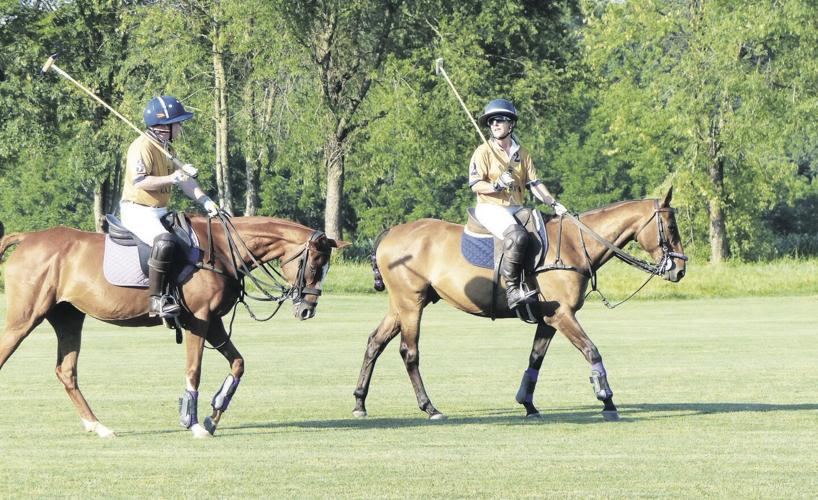The historic game of polo is shrugging off its elitist tag with the help of an entrepreneurial couple’s polo clinics designed to grow the sport’s popularity with riders of all ages and skills.
Oliva and Ata Alonso are co-founders of Ola Polo Co. and were recently at the Brandywine Polo Club in Chester County, Pennsylvania, coordinating polo instruction and play for riders of varying skills levels and ages.
Children through seniors learn the fundamentals of polo from Ata, a native Argentinian and professional polo player. “(He) helps them understand the basics and the nuisances of the game in a non-threatening way so they can relax and have fun playing,” Oliva said.

Oliva and Ata Alonso, owners of Ola Polo, with groom Carina Feretti.
Polo arrived in the United States in 1876 and was played by riders who could afford a string of high-end, well-trained ponies to ride. Its roots date to the nomadic tribes of central Asia centuries ago. The game found its way to current-day Iran in the 17th century where the nobility used it for cavalry training.
The Alonsos have been riding since they were youngsters and created Ola just four years ago during the COVID pandemic with a $400 bankroll and a dream. Today, Ola Polo is headquartered on an 85-acre Florida horse farm not far from the National Polo Center in Wellington, where the couple breed, train and house a growing number of polo ponies.
Oliva grew up in Boca Raton and has been riding since her parents put her on a pony at 3. “It was instant love and I have been riding ever since,” Oliva said.
She trained in several show disciplines as a child and discovered polo through a friend at age 12. An opportunity to spend time riding and caring for polo ponies as a teen helped her discover her true equine passion, she said.
A self-starter, Oliva took high school and college studies online and earned her undergraduate and graduate degrees while continuing to train green polo ponies. She will begin an online licensure program in mental health and equine psychotherapy in January.

Nidish Mada riding Paint horse, Ola Wynona.
The Alonsos met in 2018 when Ata came to Florida polo country to advance his career as a trainer and professional player. They married in 2020 and had already been thinking about how they could build a polo business that would allow them to own horses and expand the popularity of the sport they loved.
The idea wasn’t complicated, Ata said. “Polo players — besides being horsemen — need to own a string of polo ponies to play regularly. It has always been prohibitively expensive for a part-time rider to afford to keep a string of polo ponies to play at any level.”
The Alonsos also focus on breeding and leasing well-trained polo ponies that possess the ideal mix of endurance and skill and allow themselves to be ridden by riders of varying abilities.
“It has enabled riding enthusiasts to learn the sport or improve their polo playing abilities without the costs of owning and housing one or more polo ponies,” Oliva said.
They brought their first horses for lease to the Sarasota Polo Club in 2020 while living in their horse trailer.
“We knew we had to grow to survive,” Oliva said. “We began to add to our herd through rescues, gifts, purchase of difficult or green polo horses and horses rescued from kill pens.”

Polo horses begin to get saddled up for an evening match at the Brandywine Polo Club in Chester County, Pa.
Last year they were hired to run the polo program at Brandywine and brought a 50-horse string that included Thoroughbreds, Appaloosas, Paints and Quarter Horses to the club and revamped the polo program to retain existing riders and attract new ones.
They favor Appaloosa and Quarter Horse mixes for their ponies, believing these horses have endurance, turning ability and speed — when needed — but remain naturally calm-minded for the less experienced riders.
The couple purchased a 9-month-old Appaloosa stallion named Ola Pancho in 2021 out of a kill pen in Texas for $700 and he already has sired six polo ponies. Ola Pancho not only passes on his athletic abilities, but also his kind and calm nature and Appaloosa coloring to his offspring. The Alonsos said they will continue to breed Ola Pancho with their polo broodmares as they grow their herd with their own horses.
The Alonsos operate several organized polo programs and give a range of lessons for children to seniors. Early on, they formed a “Chica Chukkers” program to teach the fundamentals and skills of polo in a safe, no-pressure environment to women. They believe their students’ ability to play polo at an entry level has helped to increase the sport’s visibility.
The Alonsos also oversee a league where riders compete at a level where they might join or form a team to compete in one of the Brandywine Polo Club’s tournaments.
Learn more about Ola Polo on their Facebook and Instagram Pages or at: facebook.com/olapolocompany/, @olapolocompany, and olapolocompany.com






